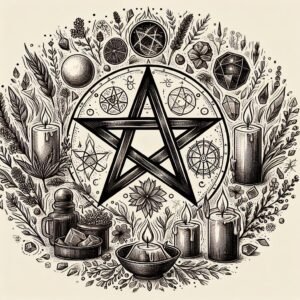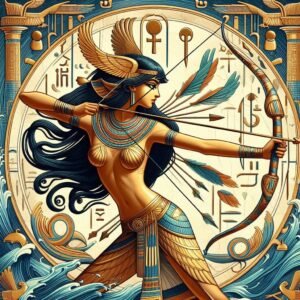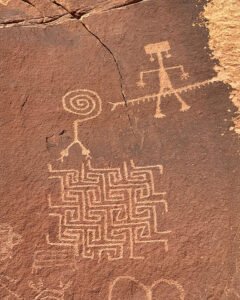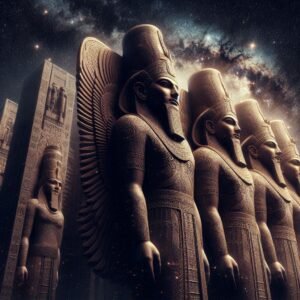
The Enuma Elish, also known as The Seven Tablets of Creation, is a Babylonian creation myth that originates from the ancient Mesopotamian religion. The narrative is one of the oldest creation stories, with its origins possibly dating back to the Bronze Age. The title “Enuma Elish” is derived from the opening lines of the myth, which translate to “When on High” in Akkadian, the language of ancient Mesopotamia.
The story begins with the universe in a state of chaos, represented by undifferentiated, swirling waters. From these primordial waters emerge two gods: Apsu, embodying the sweet, fresh waters, and Tiamat, representing the salty, bitter waters. Their union gives birth to the younger gods, who, however, prove to be a noisy and bothersome lot. Disturbed by their clamour, Apsu, with the counsel of his vizier Mummu, decides to destroy them. Forewarned by the god Ea (also known as Enki), Apsu is put to sleep and killed, and from his remains, Ea creates his dwelling.
The death of Apsu incites Tiamat to seek revenge. She creates an army of monsters and appoints her new consort, Kingu, as their leader. The younger gods, seeking a champion to defend them, turn to Marduk, the god of Babylon. Marduk agrees to battle Tiamat on the condition that he is granted supremacy among the gods. In a fierce confrontation, Marduk defeats Tiamat, slicing her body in half to form the heavens and the earth, thus establishing order from chaos.
Marduk’s victory leads to his ascension as the king of the gods. He organizes the cosmos, assigning roles to the gods, and creates humanity from the blood of Kingu as servants for the gods. The Enuma Elish concludes with a hymn of praise for Marduk, celebrating his kingship and the established order.
The Enuma Elish played a significant role in Mesopotamian culture. It was recited during the Babylonian New Year’s festival, known as Akitu, which celebrated the renewal of the world and the reaffirmation of Marduk’s power. This festival coincided with the spring equinox and the seasonal flooding of the Tigris and Euphrates rivers, which was crucial for agriculture.
The myth reflects the hierarchical structure of Mesopotamian society and the belief in the divine right of kings, with Marduk’s rise to power mirroring the political ascendancy of Babylon within the region. The Enuma Elish also offers insights into Mesopotamian views on the origins of the cosmos, the nature of the gods, and the place of humanity within the order of creation.
The Enuma Elish’s influence extends beyond its cultural and religious significance. Its themes of chaos versus order, the interplay of elemental forces, and the divine mandate of rulership have parallels in other creation myths and have been subjects of comparative mythology studies. The narrative has been analysed for its literary elements, its reflection of societal values, and its impact on later traditions and literature, including possible influences on biblical creation narratives.
For those interested in exploring the Enuma Elish further, translations and scholarly discussions are available, providing a window into the rich tapestry of ancient Mesopotamian mythology and its enduring legacy.
The Enuma Elish shares similarities and differences with various creation myths from around the world. Its narrative of cosmic battle and the triumph of order over chaos echoes themes found in other cultures’ stories of the beginning of the world.
One of the most direct comparisons can be made with the biblical Book of Genesis. Both texts begin with a formless void and move towards a separation of elements to create order. In Genesis, God speaks the world into existence, separating light from darkness, water from dry land, and so on, culminating in the creation of humanity. In the Enuma Elish, Marduk defeats Tiamat, the embodiment of primordial chaos, and uses her body to create the heavens and the earth, establishing order and assigning roles to the gods.
Another parallel can be drawn with Greek mythology, where the world emerges from chaos. In Hesiod’s Theogony, the universe begins in a void called Chaos, and through a series of generational conflicts and unions among the gods, the cosmos is formed. Similar to Marduk’s ascendancy in the Enuma Elish, Zeus rises to power after overthrowing his father, Cronus, bringing order to the universe.
The Norse creation myth also features a great void, Ginnungagap, from which the world is formed. The frost giant Ymir is killed by Odin and his brothers, and his body parts are used to create the world, much like Tiamat’s in the Enuma Elish. This act of creation from the body of a primordial being is a motif that appears in various mythologies.
In Hindu mythology, particularly in the Rigveda, there is a hymn that speaks of a cosmic man, Purusha, whose sacrifice by the gods creates the world. His mouth becomes the priestly caste, his arms the warrior caste, his thighs the people, and his feet the servants. This reflects a different aspect of creation, where the cosmos is structured according to social order, which is a contrast to the Enuma Elish’s focus on the physical creation of the world.
The Egyptian creation myths, such as the Heliopolitan cosmology, also start with a primordial ocean of chaos, Nun, from which the sun god Atum (or Ra) emerges. Through a process of self-creation or masturbation, Atum generates other gods, and eventually, the physical world is formed. The concept of creation from chaos is present here, but the method differs significantly from the Enuma Elish’s narrative of divine conflict.
In Mesoamerican mythology, specifically the Popol Vuh of the Maya, the creation involves the gods conceiving the world in darkness and then bringing it into being through thought and speech, similar to the biblical narrative. The world goes through multiple iterations before the final creation of humans, which is unlike the single act of creation seen in the Enuma Elish.
These comparisons show that while the Enuma Elish has unique characteristics that reflect the values and beliefs of the ancient Mesopotamians, it also shares universal themes with other creation myths. The struggle between order and chaos, the use of a divine body to create the physical world, and the establishment of a cosmic hierarchy are motifs that resonate across different cultures and times. Each creation myth provides a cultural lens through which to understand the values, fears, and aspirations of the society that created it, and the Enuma Elish is no exception. Its influence on later traditions and its place within the broader context of world mythology continue to be subjects of scholarly interest and comparative study.
Subscribe to our post updates - Don't miss a thing!!








